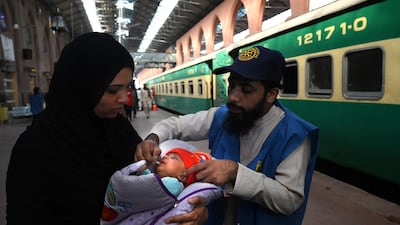I first met Sheikh Mohamed bin Zayed in 2011 when we began working together on childhood immunisation and polio eradication. His deep commitment to global health is evident not only in his financial support but also in his ability to bring together partners in the global health community and draw on the UAE’s expertise and relationships in the region.
Since we first met, I have come to Abu Dhabi several times for important global health convenings hosted by Sheikh Mohamed. The most recent was yesterday’s Reaching the Last Mile Forum, where more than 350 global leaders gathered to address issues central to elimination of infectious diseases like malaria and neglected tropical diseases such as river blindness and lymphatic filariasis.
To accelerate these efforts, Sheikh Mohamed established the Global Institute for Disease Elimination, with support from our foundation. Based in Abu Dhabi, Glide’s mission is to advance the global understanding of what has been effective in disease elimination and help countries translate that knowledge into action. At the forum, Dr Simon Bland, the new chief executive of Glide, explained in detail what that would look like. For example, Glide will draw on the lessons learned from polio eradication to help countries tackle other infectious diseases, including development of country-specific elimination strategies. It will also champion greater awareness of these diseases – river blindness, in particular.
The forum was important for another reason. Funders and partners of the Global Polio Eradication Initiative (GPEI) renewed their financial and political support for one of the most ambitious and significant public health efforts ever undertaken: ending polio worldwide, forever.
When the initiative was created in 1988, three types of wild poliovirus circulated in 125 countries that paralysed more than 350,000 children every year. Today there is one type of wild poliovirus that remains in just two countries and the number of cases has been reduced by 99 per cent. That means 18 million people today are walking who would otherwise have been paralysed.
This progress has not been easy and the last steps to reduce the threat of polio and eradicate the disease may be the toughest. Polio persists in some of the most difficult places on earth: in war zones inaccessible to vaccinators, among migrant and nomadic populations, in remote areas, in neighbourhoods where some parents do not want their children immunised and in communities lacking in basic health services that are unable to provide polio vaccines as part of routine immunisation drives.
Given that there are fewer cases of polio, detecting the virus becomes more difficult. As most people infected show no signs of paralysis, the virus can circulate silently for long periods of time before it causes paralysis in a child.
So the initiative has had to get creative about how to reach every child who may be at risk of getting polio, while also tailoring strategies to track and stop every last trace of the disease.
There are a number of ways in which the initiative has done that.
For one, it has created the largest disease surveillance system in the world to look for children with symptoms of polio or evidence of the virus in sewage samples.
Hundreds of vaccinators have been positioned at border crossings and other transit points to reach children who may not have been immunised at home.
Emergency operations centres have been established in endemic countries like Pakistan, Afghanistan and Nigeria to enable a quick response to outbreaks.
To increase receptiveness to the polio vaccine, the GPEI has integrated polio immunisation campaigns with basic health services such as bed nets, vitamin A supplements and referrals to local health clinics for those who need treatment.
The initiative works with religious clerics and traditional leaders and has engaged female vaccinators who have the credibility to increase community acceptance of the vaccine.
In the face of outbreaks of a form of polio that can pop up in populations with very low immunity, the GPEI is working with Gavi, the Vaccine Alliance to ensure that all children are administered the polio vaccine through stronger health systems and vaccination campaigns. In addition, a promising new oral polio vaccine is currently in clinical trials that if proven safe and effective will be an additional tool to protect children from all forms of polio.
I am optimistic that with the GPEI’s persistence and creativity – and the continued support of partners, donors, and endemic country leaders – we will eradicate polio.
I was encouraged this week to see the world rally again in support of the initiative with commitments from a wide range of donors including Sheikh Mohamed; countries such as Germany and Australia; endemic country leadership from Pakistan, Afghanistan and Nigeria; GPEI partners like Rotary International; and philanthropic organisations including Alwaleed Philanthropies, Bloomberg Philanthropies, the Charina Endowment Fund, Dalio Philanthropies, the Tahir Foundation, and the Ningxia Yanbao Charity Foundation. These were in addition to the United Kingdom that announced its support earlier this month.
The support demonstrated by these donors and partners is a powerful example of what is possible when we come together to tackle one of the world’s biggest challenges.
It is exciting to see this happening in other areas of global health beyond polio.
Last month, the Global Fund Replenishment Conference raised $14 billion to continue the fight against Aids, tuberculosis and malaria. And next June the global community will meet to reaffirm its support of Gavi and its commitment to ensuring equal access to vaccines for children in the world’s poorest countries.
While each of these partnerships is focused on solving a specific problem, together they signal a new era in global health where we are learning from one another how to send the diseases of poverty into retreat. It is a remarkable moment – bringing us closer to a world where the place you are born does not determine your opportunity to survive.
Bill Gates is the co-founder of Microsoft and the trustee and co-chair of the Bill and Melinda Gates Foundation


